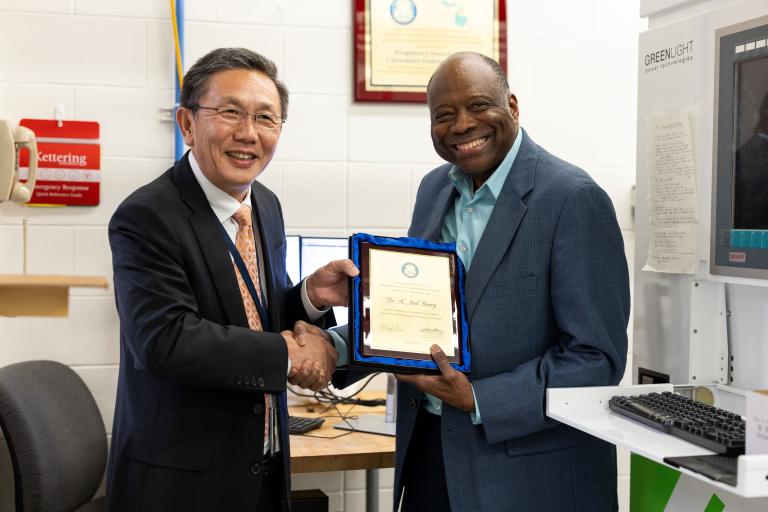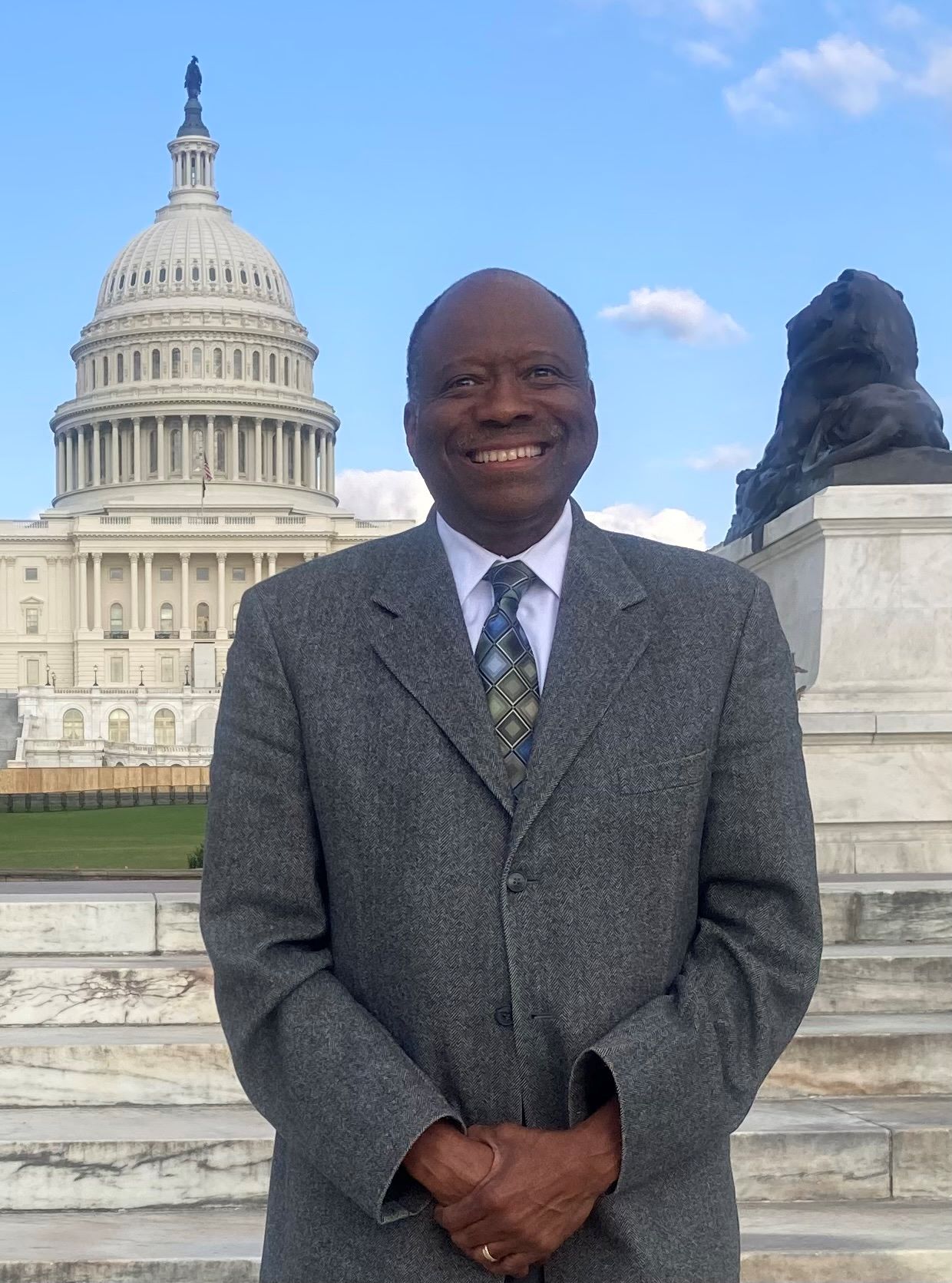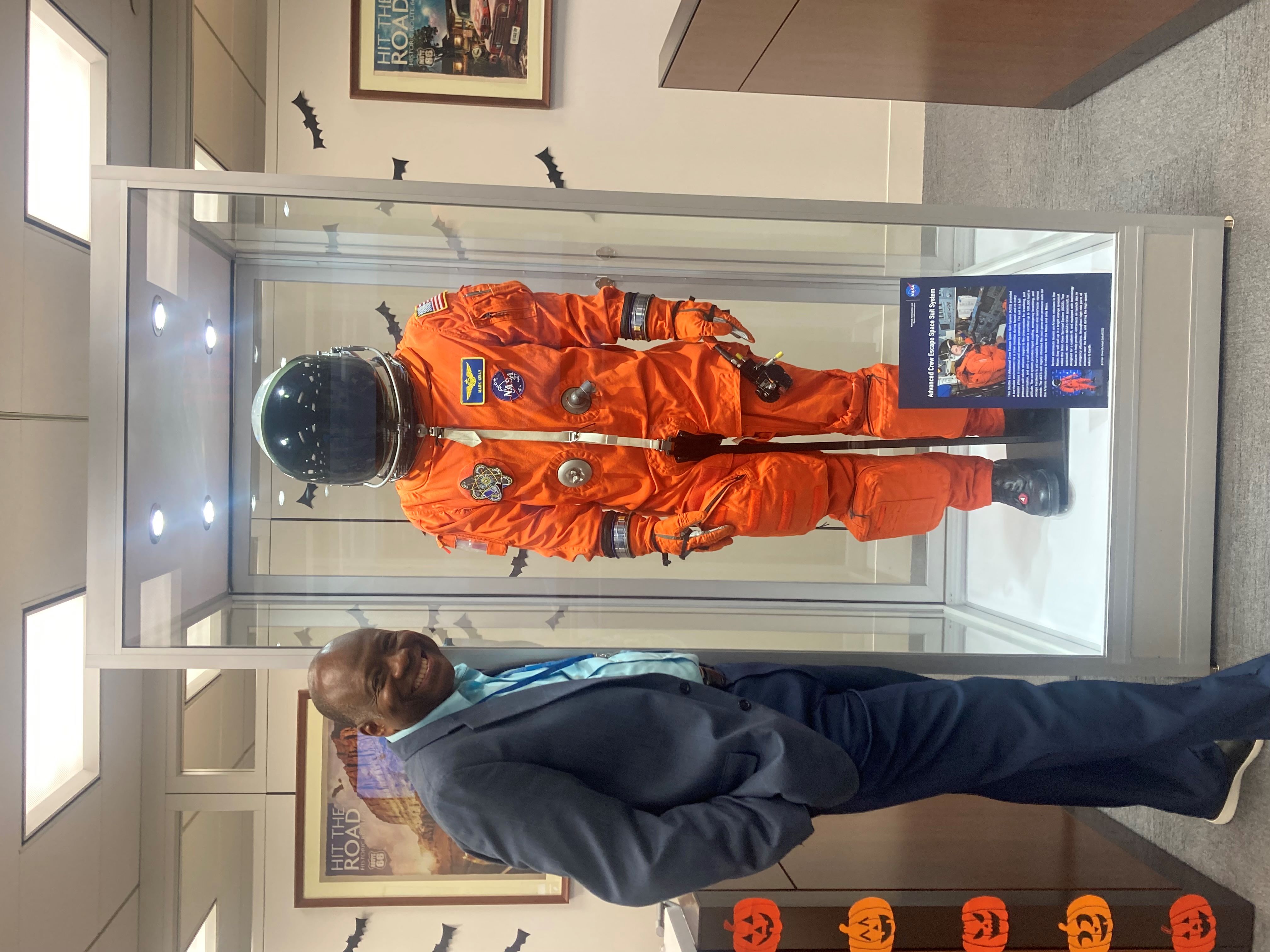
Provost Dr. James Zhang and Dr. K. Joel Berry dedicate the Kingsberry Sustainability Lab
“I want this laboratory to allow future students to benefit from innovative technology. This endowment will be here for centuries after I’m gone.”
Engineering a Legacy: Dr. Kingsley Joel Berry’s Lasting Impact on Kettering University
Not everyone can say they’ve left a legacy that aligns directly with the institution’s future, but Dr. Kingsley Joel Berry ’79 ME has. For almost 50 years — first as a driven student, then as the youngest Mechanical Engineering professor and eventual department head — Dr. Berry set the standard for innovation, education, and community impact at Kettering University. His recent $200,000 endowment to launch the Kingsberry Sustainability Lab exemplifies Dr. Berry’s deep commitment to the generations who will follow.
From Student to Professor
Dr. Berry’s journey began in the 1970s when he enrolled at General Motors Institute (GMI), where his curiosity and tenacity quickly set him apart. As one of the first African American students at GMI, he knew this opportunity could define his life’s path. “Coming to GMI was the best decision I made,” he says. After earning his degree in Mechanical Engineering with a minor in Automotive Engineering, Dr. Berry pursued a master’s in Engineering Mechanics at Michigan State University and later a Ph.D. at Carnegie Mellon University. By 1986, he was back at Kettering, stepping into a faculty career that would influence generations of future engineers.
A Trailblazing Educator
Dr. Berry became the youngest faculty member in Mechanical Engineering and embraced the challenges of being a trailblazer as the only person of color in the department. “I had never taught a full class before,” he admits, but he quickly developed his teaching methods and significantly impacted his students. Over the years, he rose through the ranks to the department head. In his nearly two decades in that role, he helped build new labs, restructured the curriculum, and secured over $5.7 million in funding to ensure Kettering students gained hands-on experience with cutting-edge technology.
Throughout his career, Dr. Berry published more than 50 articles related to his research and stamped his name on four patents. Fuel cells and related work became central to his research. The Flint Journal dubbed Dr. Berry “Flint’s Fuel Cell Father” for his dedicated efforts to ensure that the Vehicle City would play a key role in shaping the future of automotive transportation. In 1993, he earned the Charles L. Tutt Award for Innovative Teaching, an honor named for former GMI Dean of Engineering Dr. Charles L. Tutt. A year later, Dr. Berry was named GMI Outstanding Professor of the Year. In 2021, he was honored with Kettering's prestigious Rodes Professorship award, which recognizes faculty for outstanding scholarly achievement, and a $5,000 grant to support continued research. Then, in 2024, Dr. Berry made the decision to retire from the classroom — but not before ensuring his legacy with a significant gift to the University.
A Vision for the Future: The Kingsberry Sustainability Lab
In an impressive gesture, Dr. Berry and his wife Linette recently announced a generous $200,000 endowment to establish the Kingsberry Sustainability Lab at Kettering University. This gift is not just a one-time donation; it’s an investment in the future. He envisions a space where students can explore fuel cells, alternative energy, and technologies that will shape a sustainable world. Dr. Berry’s decision to fund this laboratory is rooted in a belief he must “pay it forward” to honor the opportunities he received. “I want this laboratory to allow future students to benefit from innovative technology,” he explains, pointing to the importance of fuel cell technology and alternative energy in addressing climate change.
With his endowment, Dr. Berry aims to inspire others to invest in the future of education, setting a challenge for fellow faculty members and alumni to contribute as well. “I want this to be an example for other faculty ... even if it’s just like $20,000, $10,000 ... to inspire,” he says, highlighting community support's critical role in sustaining educational excellence.
“This endowment will be here for centuries after I’m gone,” he states firmly, underscoring that his contributions are not solely about personal accolades but about enriching the lives of future generations.
 Dr. Berry Goes to Washington
Dr. Berry Goes to Washington
Although Dr. Berry is no longer teaching at the University, he is educating a new audience: federal lawmakers. Dr. Berry’s latest role is in Washington, D.C., as an ASME Congressional Fellow, working in the office of Sen. Mark Kelly of Arizona, focusing on technology policy development, particularly in artificial intelligence and energy initiatives. Reflecting on this new chapter, he expresses excitement about the opportunity to influence policy at the national level. “It’s great ... this is the perfect transition for me ... the staff is so positive, so encouraging,” he says. His experience at Kettering has equipped him with the skills to address pressing issues like STEM education, Artificial Intelligence and energy, and workforce development — critical concerns as new facilities emerge as a result of significant investments in semiconductor manufacturing.
A Lasting Legacy
As Dr. Berry steps into the next phase of his life, he does so with the intention of motivating others — faculty members, students, and the broader community — to engage, contribute, and make a difference. “Excellence is achieved by people, passion, and purpose, not policy,” Dr. Berry says, encapsulating his belief in the transformative power of education and community.

Dr. Berry's close-knit family shares his commitment to education and environmental sustainability. He and his wife Linette share four adult children, all of them involved in scientific fields. His daughters, Ashley ’08, M’13, and Sydney ’12, M’12, are Kettering University alumni, and his youngest daughter, Kimberly, holds a Ph.D. in neuroscience from the University of Pittsburgh. His son Jonathon is earning a master’s degree in mechanical engineering from Johns Hopkins University and expects to graduate in May 2025.
Dr. Berry’s faith plays a central role in his journey, shaping his belief that everything he has achieved is part of a divine plan. “I fundamentally believe this has been God’s plan for me,” he says. “ ... It’s my way of paying it forward and backward, and it's my way of thanking God for all my blessings in my life.”